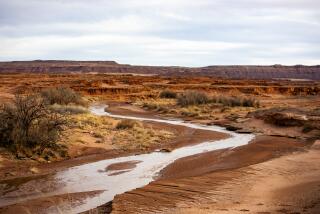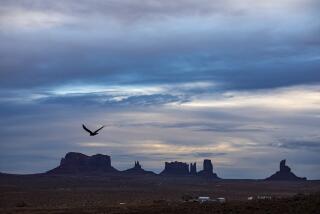Utah Freezes Navajo Fund as Report Details Scandal : American Indians: An audit alleges state, as trustee, looked the other way as oil royalty trust account was plundered.
- Share via
Utah Gov. Norman H. Bangerter has frozen most expenditures by an oil royalty trust fund set up for Navajos in southern Utah following an audit of the fund which alleged massive waste, misappropriations and theft.
Much of the royalty fund, amounting to $61 million over the last 30 years, has been misspent by tribal officials while the state of Utah, the fund trustee, looked the other way, according to the report by the Utah legislative auditor. Only $9.5 million remains in the fund.
Bangerter said he may seek removal of the state as trustee.
For Navajos living in San Juan County, Utah, on a small strip of the reservation, the report confirms what many have long believed: that their interests fall through the cracks of tribal, state and federal governments, and that even their own representatives may have betrayed them.
Royalty funds were used to bribe Navajo officials, finance unsound business ventures and support services that should have been financed by state, federal and tribal governments, the report charged.
“The audit reads like a cheap novel,” said Utah’s Republican House Speaker Craig Moody. As a result of the fund’s poor management, basic goods and services elude Utah’s Navajos. Although 350 million barrels of crude oil have flowed from lands controlled by the tribe since 1956, nearly 75% of the Navajos living there still do not have running water or electricity.
The area’s poverty rate is more than three times the state average. It is also one of the poorest settlements on the Navajo reservation, most of which lies across the border in Arizona.
The fund was controlled by two tribal organizations. Utah’s Division of Indian Affairs, a state arm, essentially rubber-stamped all spending by the two organizations, auditors said.
The fund was depleted by “unnecessary” land purchases, “lavish” awards and incentives, and “extravagant” retreats and parties by officials of the two Navajo groups, according to the report.
Bangerter, a Democrat, said the state has never been effective in managing the trust because of conflicts with Navajos. “The state cannot exercise its duties as a trustee without taking away the self-determination of the Navajo people,” he said. He wants the state removed as trustee unless it can exercise more control in how monies are spent.
Many Navajos in Utah want the state to remain as trustee, said Mark Maryboy, a Navajo on the San Juan County Commission. The tribal council in Arizona has asked for repeal of the 1933 law which enables Utah to control the fund, but Maryboy and others fear that if control of the trust is handed to tribal headquarters, few dollars will return to the Utah Navajos.
More to Read
Sign up for Essential California
The most important California stories and recommendations in your inbox every morning.
You may occasionally receive promotional content from the Los Angeles Times.










